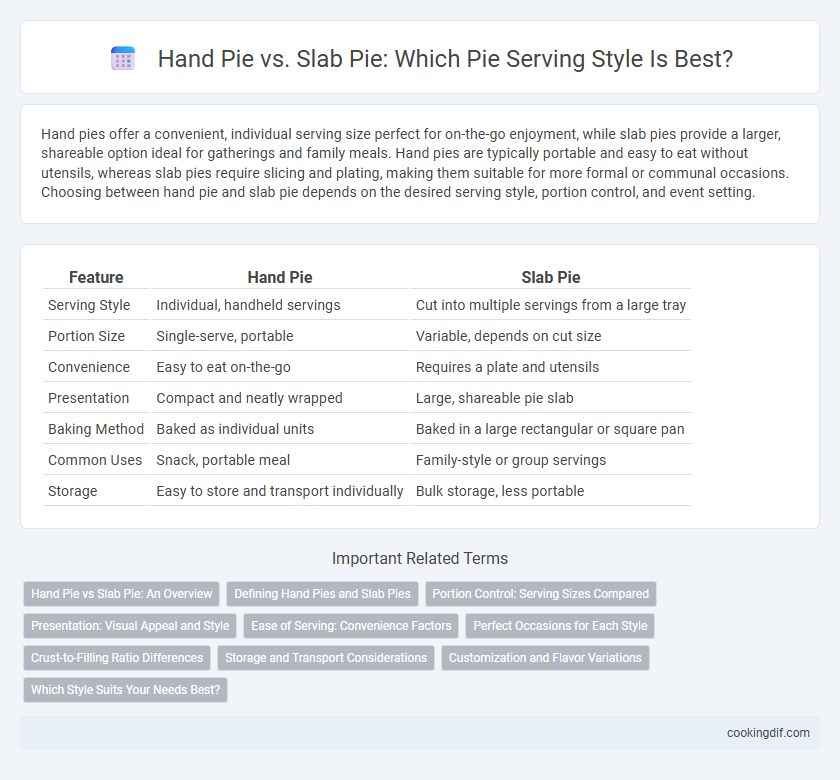Hand pies offer a convenient, individual serving size perfect for on-the-go enjoyment, while slab pies provide a larger, shareable option ideal for gatherings and family meals. Hand pies are typically portable and easy to eat without utensils, whereas slab pies require slicing and plating, making them suitable for more formal or communal occasions. Choosing between hand pie and slab pie depends on the desired serving style, portion control, and event setting.
Table of Comparison
| Feature | Hand Pie | Slab Pie |
|---|---|---|
| Serving Style | Individual, handheld servings | Cut into multiple servings from a large tray |
| Portion Size | Single-serve, portable | Variable, depends on cut size |
| Convenience | Easy to eat on-the-go | Requires a plate and utensils |
| Presentation | Compact and neatly wrapped | Large, shareable pie slab |
| Baking Method | Baked as individual units | Baked in a large rectangular or square pan |
| Common Uses | Snack, portable meal | Family-style or group servings |
| Storage | Easy to store and transport individually | Bulk storage, less portable |
Hand Pie vs Slab Pie: An Overview
Hand pies offer convenient, individual portions perfect for on-the-go enjoyment, featuring a folded crust encasing sweet or savory fillings. Slab pies are large, rectangular pies typically baked in a sheet pan, designed for easy slicing into multiple servings ideal for gatherings or family meals. The choice between hand pies and slab pies depends on the desired serving style, portion control, and presentation preferences.
Defining Hand Pies and Slab Pies
Hand pies are individual-sized pastries filled with sweet or savory ingredients, designed for easy handheld consumption without utensils. Slab pies, also known as tray or sheet pies, are large, rectangular pies baked in shallow pans and cut into square or rectangular servings. Both serving styles offer versatile presentation options but differ significantly in portion size and convenience.
Portion Control: Serving Sizes Compared
Hand pies offer precise portion control with individual servings typically ranging from 3 to 5 ounces, making them ideal for consistent calorie and nutrient tracking. Slab pies, often baked in large trays, require cutting into pieces that vary in size, which can lead to uneven serving portions and potential overconsumption. Choosing hand pies over slab pies simplifies serving logistics and provides better management of nutritional intake per portion.
Presentation: Visual Appeal and Style
Hand pies offer a charming, individual presentation with their handheld, portable form and golden, flaky crusts that appeal visually through intricate crimping or decorative venting. Slab pies serve as a centerpiece with large, uniform surfaces that can be artistically adorned with lattice tops, cut-out designs, or colorful glazes, emphasizing shared enjoyment and communal dining. The choice between hand pie and slab pie for presentation depends on the desired serving style: personalized elegance versus rustic, inviting abundance.
Ease of Serving: Convenience Factors
Hand pies offer superior ease of serving due to their individual, portable size, eliminating the need for slicing and minimizing mess. Slab pies, often baked in large pans, require cutting into portions, which can lead to uneven pieces and additional cleanup. For quick, grab-and-go convenience, hand pies are the preferred choice in various food service and event settings.
Perfect Occasions for Each Style
Hand pies are ideal for casual gatherings, picnics, or on-the-go snacking, offering convenient individual portions and easy handling. Slab pies suit large family dinners, potlucks, or holiday feasts, providing a shareable dessert that can feed multiple guests. The serving style selection depends on the event size and guest interaction preferences, with hand pies emphasizing portability and slab pies emphasizing communal sharing.
Crust-to-Filling Ratio Differences
Hand pies feature a higher crust-to-filling ratio, offering a firmer, more portable bite with a distinct pastry shell that balances each mouthful. Slab pies have a thinner crust relative to the filling, emphasizing juicy, dense interior layers ideal for serving multiple portions. This difference significantly influences texture, flavor distribution, and presentation in pie serving styles.
Storage and Transport Considerations
Hand pies offer superior portability and ease of individual serving, making them ideal for on-the-go consumption and simple storage without the need for slicing. Slab pies, while more challenging to transport due to their larger size and form, provide a traditional presentation that can be easily portioned for group servings. Proper packaging with airtight containers is essential for maintaining freshness in both styles during storage and transport.
Customization and Flavor Variations
Hand pies offer greater customization with individually portioned crusts that can be filled with diverse sweet or savory ingredients, allowing for personalized flavor combinations in each serving. Slab pies, baked as a large single crust, provide consistent flavor throughout but can support layered or mixed fillings for varied taste experiences in every slice. Both styles enable unique flavor variations, though hand pies excel in individual customization, while slab pies emphasize uniformity and shared presentation.
Which Style Suits Your Needs Best?
Hand pies offer portability and individual portions, making them ideal for on-the-go snacking or casual gatherings. Slab pies provide larger servings and are perfect for family-style meals or events where slicing and sharing are preferred. Choosing between hand pie and slab pie depends on the desired convenience, portion size, and serving setting.
Hand pie vs slab pie for pie serving style Infographic

 cookingdif.com
cookingdif.com